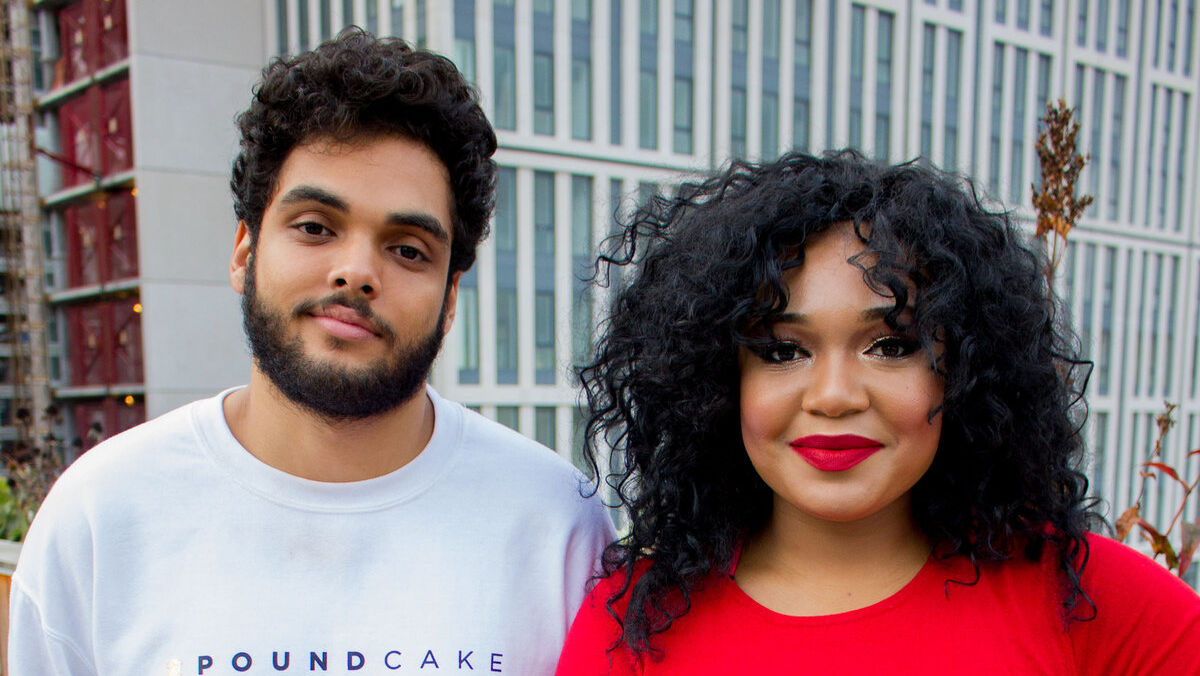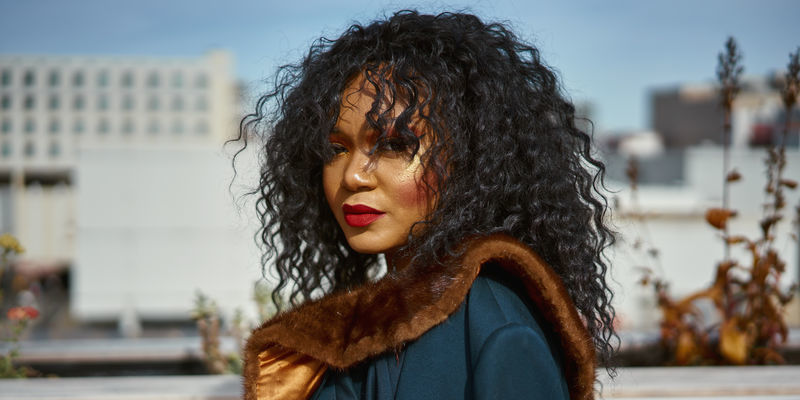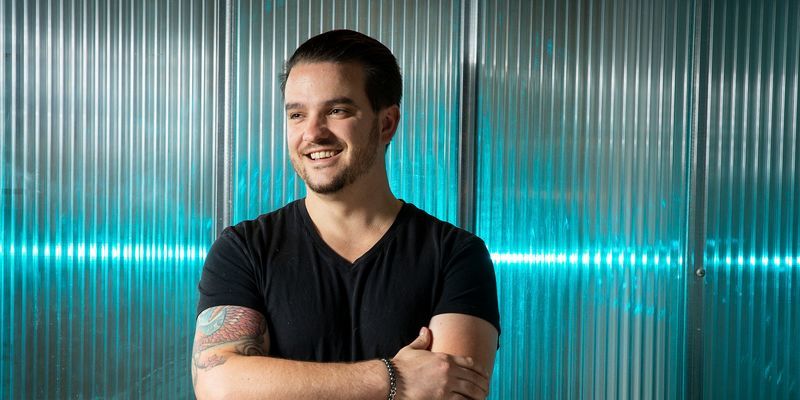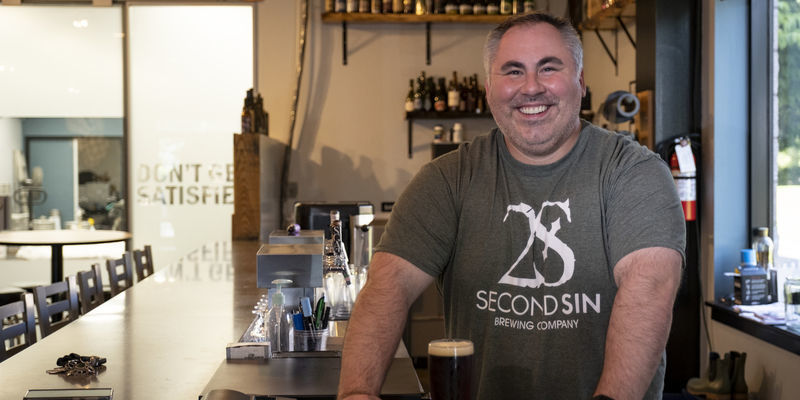Black, Brown and red all over: How two Temple alumni are using lipstick to make the world a more inclusive place
Growing up in rural Pennsylvania, Temple alum Camille Bell faced racism at school and difficulties at home. Now, those experiences drive Bell as she and fellow alum Johnny Velazquez make the beauty industry more inclusive through Pound Cake, a $1 million startup focused on cosmetics for Black and Brown complexions.

The entranceway to Reading High School, located about an hour northwest of Philadelphia, can be intimidating. Castle-like spires adorn its towering facade, imposing flights of steps must be traversed to reach its front doors.
But when 10th grader Camille Bell, KLN ’15, clamored off of a school bus from a neighboring school district in 2008 for a basketball game, she noticed something else.
There’s way more Black people here than at my high school, she thought.
Unlike Reading, an urban team on which most of the players were Black, Bell was the only nonwhite girl representing her own Twin Valley High School. In fact, she was one of just a few in the entire student body of Twin Valley, located in a rural, predominantly white pocket of Berks County.
Growing up in that environment, Bell was constantly reminded that her complexion made her an “other.”
In seventh grade, there was the Spanish teacher who said Bell couldn’t use the name Bella for class, because that meant “beautiful.” The same year, a student made a lynching threat, necessitating police involvement. As she advanced to high school, there were Confederate flags on T-shirts, racial slurs in the hallways and a particularly painful transgression at the movie theater.
“The movie was The Planet of the Apes. A kid yelled out, ‘Camille that’s your whole family up there,’” Bell recalled. “That does something to your psyche.”
Bell’s visit to Reading gave her a glimpse into a different world. That spring, she transferred to Downingtown West High School in neighboring Chester County, looking for a fresh start. It was an improvement. But the student population was still predominantly white.
Truth be told, home life was also difficult. Camille’s mother, a Liberian immigrant, passed away from sickle cell anemia when she was just 3 years old. Her father was strict, forbidding Bell to wear makeup and minimizing the racism she faced at school. Money was tight. There were other traumas Bell still privately grapples with as she now approaches her 30s.
To truly build something new for herself, Bell needed space, independence and a chance to build a support system. What she found was Temple.
Temple transformation
When Jonathan Velazquez, KLN ’18, arrived at Temple in 2013 from his hometown of Atlanta, he met a seemingly unflappable Camille Bell.
Velazquez was enrolled in a Living Learning Community, a residential program at Temple that groups together like-minded students. Bell—then a junior—was their student staff member in the White Hall dormitory, tasked with helping ease the students’ transition.
“She just had this aura of … I don’t know, competency, and initiative,” Velazquez recalled.
Indeed, Bell had done a lot of growing in her first two years at Temple’s campus. On paper, she was pursuing a degree in public relations, advertising and applied communication. Really, she was forging a new identity, in a big city with plenty of faces who looked like hers.
“I tried to really just ingrain myself with as many Black and Brown people as I could,” Bell said.
Bell joined the university’s National Council of Negro Women, and frequently attended meetings for the National Association for the Advancement of Colored People (NAACP). She picked up a minor in African American studies. She researched her family ties in Liberia, while building a circle of friends and professional network on campus.
But even in the city with the second largest Black population in the country, Bell found racial inequity staring her in the face.
While hostessing in a Center City restaurant sophomore year, a white woman with “gorgeous, deep red lipstick” walked in. Bell couldn’t help but ask where she got it, and the woman told her it was called “Ruby Woo,” by MAC Cosmetics. Bell rushed to a nearby store to buy it.
“I was super excited. But I put it on, and looked nothing like her,” Bell said. “I remember feeling so sad. I wanted it to look like on me, what it looked like on her.”
Bell came to understand that American cosmetic products are nearly always designed for people of lighter complexions, complicating beauty for those with black and brown skin tones. The realization lit a fire.
Shortly after graduating from Temple in 2015, Bell walked into the offices of the university’s Blackstone LaunchPad, a program that offers guidance to students and alumni who are thinking about entrepreneurship.
Julie Stapleton Carroll, the program’s director, remembers an inexperienced but impressive student.
“She came in, and said, I have an idea,” Carroll recalled. “But I don’t know what to do with it. I need some help.”
Pound Cake
As Hollywood entered its golden age in the early 20th century, it brought with it new standards of beauty and a slew of cosmetic products advertised to achieve them. That included “pancake” makeup, a cosmetic foundation named in part for its resemblance to light-colored cake batter.
Bell told Carroll she wanted to crush that legacy. She wanted to “pound cake,” and create a company by that name to disrupt the modern cosmetics world by designing products for Black and Brown lips and skin.
But she knew nothing about the industry.
“I told her it would probably be helpful if you went to a tradeshow and found some mentors,” Carroll remembered.
Bell took Carroll’s advice and began to make contacts, while researching how one goes about creating a product. The stories she found were both inspiring and daunting: Oprah being fired from a news job before making it big, Amazon taking more than a decade to find traction, an aerosol spray that went through more than 240 formulations before hitting the market.
An early mentor questioned Bell about whether she had the motivation to overcome all that.
“I told her, ‘I’m so sick of not being included. It makes me feel terrible. It makes the hundreds of Black and Brown people I interviewed feel terrible, and not worthy and not beautiful,’” Bell recounted. “She told me that it would be very important to keep track of that answer.”
Building a business
As Bell began to build a business plan for Pound Cake, she reached out to Velazquez, a media studies and production major, to help her build a slide deck to pitch Pound Cake at the annual Fox School of Business Innovative Idea Competition.
Velazquez, who is half Black and half Puerto Rican, had a burgeoning interest in racial justice issues and became instantly enamored with the idea.
“She came to me at a turning point in my life … and what stuck out to me about Pound Cake was how much it focused on inclusion and breaking down harmful and marginalizing systems,” Velazquez said.
The two received valuable feedback from the Fox competition, but still walked away with just $500. In the ensuing years, Bell juggled a full-time job while traveling the country, unsuccessfully pitching investors.
“We were pitching that this was a problem. And we were hearing, ‘No it’s not,’” Bell said.
Anne Beal, a physician turned healthcare executive turned entrepreneur, who met Bell on the pitching circuit as she promoted her own AbsoluteJOI skincare products, says the venture capital world is not kind to Black women. In 2021, she points out, the digital news outlet Crunchbase calculated just 0.34% of funding goes to companies founded by Black women.
Beal compares that to the story of the “Pinky Glove,” a single-use plastic glove designed by a man, for women to use when removing their tampons. A male judge on a German reality TV show invested $36,000 after hearing the pitch.
“[White male] founders right now can come forward with a half-assed idea and get funded, because the guys on the other side of the table look like them,” Beal explained.
A turning point finally came for Pound Cake in 2017, when R&B singer Rihanna launched Fenty Beauty, an inclusive cosmetics chain trying to solve some of the same problems that Bell had identified. While the launch from a well-resourced superstar could have been a gut punch, Bell said it actually helped her business by validating her vision in high circles.
The same year, Bell and Velazquez again entered a Fox School of Business pitch competition, but this time walked away with $10,000. They also launched an Indiegogo campaign with a goal of raising $20,000 from the public. Friends, family and their wider circle chipped in $10 or $20 at a time to get them halfway there. Then in the closing hours they received a surprise $10,000 donation from Quickbooks, an accounting software company.
“We were jumping up and down, screaming,” Velazquez recalled.
Unbeknownst to the duo, their most challenging days were still ahead.
Back to the lab
With more than $30,000 in hand, Bell and Velazquez could finally set out to create actual prototypes of their first product. This would be the most essential part of their business strategy: formulating a lipstick that was customized for a customer’s individual lip tone, to ensure the color stayed true upon application.
But their efforts crumbled.
After plowing money into research and development at their first lab in California, they received an initial sample in 2018.
“It was trash,” Bell said, unequivocally. “It wasn’t even red.”
After further iterations produced similar results, Bell took their business to a different lab in Canada. Over the following year, things looked promising. But then “all hell broke loose” when COVID-19 descended and the laboratory dropped Pound Cake to focus on other customers.
“We lost all of the work we had done for two years, and had to start over,” Bell said.
In 2021—six years after Bell had first walked into Carroll’s office with her idea—things finally started going her way. She secured a new lab in New Jersey that produced a product meeting her standards, while also using “clean beauty” ingredients proven safe for human application.
Using a fresh $10,000 award from cosmetics company Glossier, Pound Cake launched its first online sale in fall of 2021 and sold out within 24 hours.
Momentum continued into 2022, when Pound Cake received a $50,000 award from MUSE, a business accelerator program sponsored by cosmetics industry giant Ulta Beauty, and was also named to TIME magazine’s Best Inventions list.
These were big breaks. But behind the scenes, things had never been more dire.
Make or break
In March 2022, Bell lost her day job as a digital marketing manager with a tech company. She dug into her 401k in order to fund her living expenses, and calculated that she only had six months left before she would have to find another paying job. Bell privately wondered to a circle of friends if it would even be wise to plow ahead.
Lauren Tilghman, a friend and confidant Bell met during a stint working for the Community College of Philadelphia, was one of those on the other end of the line.
“My advice was to look at how many people had already supported her … the people out there that believe in her … and keep going,” Tilghman said.
Bell and Velazquez applied to Black Ambition, a nonprofit founded by music producer Pharrell Williams to support Black entrepreneurs through a competitive awards program with a top prize of $1 million.
As the year progressed, they watched as Pound Cake advanced from an original applicant pool of more than 1,000 to the final 30, guaranteeing them at least $15,000. The final test came on Nov. 1, when Bell made an onstage pitch in Virginia to a panel of judges, with Pharrell and his entourage in the room.
Bell was so nervous she made Velazquez leave the building, and purposely left her glasses behind so that she didn’t have to see the audience. The strategy appeared to work—other contestants told Bell she’d nailed it—but the moment of truth would arrive at a black-tie awards ceremony a few days later.
Housed in a massive tent occupied by what Bell estimated were at least 1,000 attendees, the gala shook her. Bell waved off the complimentary hors d'oeuvres and wine, too nervous for either. They watched as competitors one-by-one earned lesser prizes, until it was down to just Pound Cake and one other contestant.
The judges began to announce second place. Bell stuck her leg out from her table, preparing to stand up. But they called the other finalist’s name. Realizing she’d won, Bell immediately broke down.
Crossing the stage to accept first prize, Bell’s face held both parts of her journey. In her eyes, Bell was a mess, her mascara running with tears. But below, her lips looked perfect: they were enveloped with her product, a deep red “Bloodberry,” perfect for a crisp autumn evening.
“It was just so wild. I took so many risks … I’ve been on my own since 2017 … I was just running out of money,” Bell said. “And we won $1 million.”
Bell and Velazquez say they’ll be able to use that money to pay themselves a salary for the first time. At time of publication, Pound Cake is nearing an agreement with a national retailer to carry their products in hundreds of stores nationwide by fall 2023. The prize money will go a long way to building up supplies of product to fulfill their end.
As their journey so far has shown, any number of things can still go wrong. Deals can break down, products can sell poorly, global pandemics can strike.
But Bell still has an ace up her sleeve. It’s the same one she’s pulled out in her darkest moments so far: the memory of a young girl in pain, with no choice but to try and change her world.
“I know what it’s like to feel excluded, to feel like an outsider,” Bell said. “While it’s the root of my pain ... it also instilled drive and discipline in me.”
- Kyle Bagenstose


